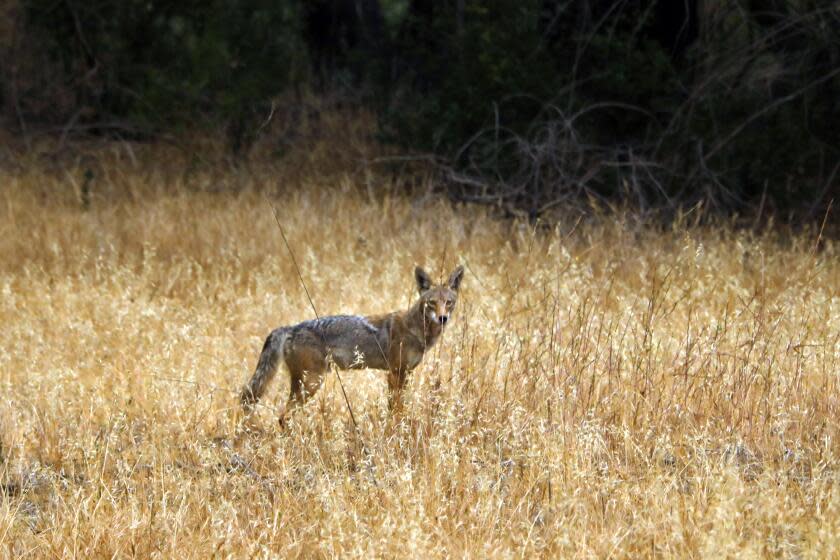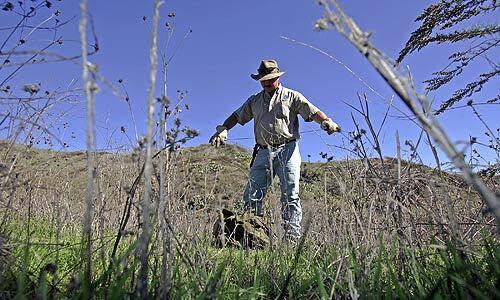Torrance coyote trapper investigated for possible violation of state law

Efforts by animal activists to get allegations concerning a longtime coyote trapper in Torrance before L.A. County prosecutors have paid off — though it remains to be seen whether legal action will be taken .
Torrance’s top attorney said last week that the findings of an investigation into the trapper for a possible violation of a state law — which bans traps within 150 yards of a residence without written consent — presents a potential conflict of interest for the city, which has an ongoing contract with the trapper. So the city sent the case to the county.
PETA had set the events in motion. In a Feb. 14 letter, People for the Ethical Treatment of Animals called on state wildlife officials to look into allegations that coyote trapper Jimmie Rizzo reported placing traps “in areas in which any possible trap placement would have been within 150 yards of dozens of residences.” The letter, signed by PETA lawyer Mary Maerz, states there is “no indication” that Rizzo or others received written consent of the landowners.
The law in question “is set up to protect people and their companion animals — because snares are indiscriminate killers,” PETA spokesperson Lisa Lange said.
An exhibit included in PETA’s letter reports that on Oct. 5, 2023, Rizzo captured a healthy adult male coyote weighing about 28 pounds on a city-owned lot on Vine Avenue. A separate exhibit includes a map showing numerous residences within 150 yards of the center of the lot. The letter includes examples of alleged violations dating to 2022.
Read more: A rare songbird's epic journey from the edge of extinction back to the L.A. River
The response was swift. A California Department of Fish and Wildlife law enforcement official responded the same day, notifying Maerz that staff had been assigned to investigate, according to an email obtained by The Times. Capt. Patrick Foy, of the department’s law enforcement division, said the agency conducted an investigation and filed the findings as a formal complaint with the Torrance City Attorney’s Office on April 3. No citation was issued.
In an email, Foy said the complaint “outlines the facts gathered during an investigation and therefore allows the prosecuting attorney the discretion to determine whether a violation of the law has occurred.” He said the agency’s investigative reports are not public documents and declined to provide it.
Torrance City Atty. Patrick Sullivan said the case was turned over to the Los Angeles County district attorney’s office, and a spokesperson for the D.A. confirmed the case is under review.
Maerz requested that the case be handed over to county prosecutors, arguing that Torrance officials renewed Rizzo's contract despite his alleged flouting of regulations. Violation of the trapping law highlighted in PETA’s letter is a misdemeanor.
Reached by phone last week, Rizzo denied being under investigation. "They've misrepresented it," he said of the animal rights activists. "I think they probably would like it to be [an investigation], but no."

Mississippi Delta-born Rizzo is a trapper with Coyote, Wildlife and Pest Solutions, which was hired by Torrance in the fall of 2021, city documents show. As of April 2022, the city reported paying the Anaheim company $4,600 a month. Fourteen coyotes were captured and killed by the end of March that year.
Trapping and killing coyotes in urban settings is contentious but not uncommon. Rizzo’s company was also hired by the city of Rancho Palos Verdes, for example.
Last September, Torrance extended the company’s contract through Oct. 7, 2024, at a cost of roughly $79,000, according to a city document attached to PETA’s letter.
When a coyote walks into a snare trap, a loop pulls tight "like a choke chain," and holds it in place, The Times reported in a 2009 profile on Rizzo.
The Times described his services as spanning from Pacific Palisades to Twentynine Palms — "at once widely sought and controversial, reflecting suburbia’s conflicted relationship with its wildlife."
Read more: Joshua Tree's celebrity rattlesnake wrangler wants to change how you see reptiles
Coyotes are derided by some for snacking on pets, or seen as a threat to small children. Opponents of trapping argue that it doesn’t work. Take one coyote out and another moves in, so the logic goes.
Rebecca Dmytryk, chief executive of Humane Wildlife Control, who has also accused Rizzo of wrongdoing, said she’s been pushing back on the practice in Torrance since about 2016.
"We've all been kind of trying to get the city to understand that it's a waste of taxpayer dollars to do this because you will never get rid of the coyotes on the landscape by doing this," she said. "You'll exacerbate the problem."
Coyotes are part of the natural environment, Dmytryk said, but their density can be reduced if people stop providing "subsidies," in the form of pet food, garbage and other coyote delicacies.
This story originally appeared in Los Angeles Times.

